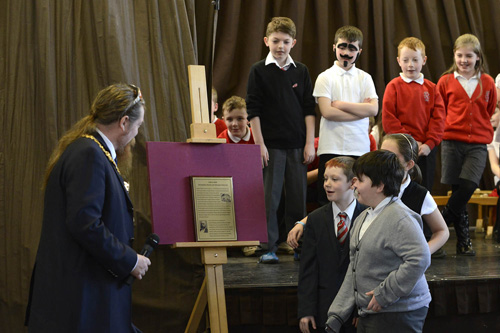
Dalrymple is a very small town in Scotland, in the middle of Robert Burns country. It has no particular claim to fame in Scottish history, but plays a significant role in the history of the Ontario Veterinary College (OVC). Just outside of Dalrymple, on a farm known as Burnton, a boy named Andrew Smith was born in 1834.
Twenty-five years later, the newly graduated veterinarian Andrew Smith came to Canada and founded OVC.
As part of OVC’s 150th-anniversary celebrations, dean Elizabeth Stone and chief administrative officer Carol Ann Higgins took a plaque to Dalrymple in recognition of Smith’s birthplace and to mark his achievements. They visited Glasgow at the invitation of the University of Glasgow School of Veterinary Medicine, which was celebrating its own 150th anniversary.
That afforded them a perfect opportunity to visit Smith’s birthplace. Explains Stone: “We contacted the community’s provost, Jim Todd, and suggested that the plaque be placed somewhere in Dalrymple, perhaps at the library or church.”
The text on the plaque reads:
“Andrew Smith
Veterinarian, Educator and Dalrymple Native Son
“Andrew Smith was born on July 12, 1834 in Dalrymple and was the only child of James Smith and Agnes McNider. He attended the parish school and worked on the family’s 160 acre farm until he entered Edinburgh Veterinary School, graduating in 1861 with high honours. He was then asked by the Board of Agriculture of Upper Canada to establish Canada’s first veterinary school, the Upper Canada Veterinary College.
“Smith opened a private clinic for horses in Toronto and gave public lectures and anatomical demonstrations. Soon he established a formal program and the first three students graduated in 1866 and were granted diplomas by the Board of Agriculture. In 1870, Smith erected the first veterinary school building in Canada, which was named the Ontario Veterinary College (OVC). In 1897, the OVC became affiliated with the University of Toronto.
“Smith and the OVC were important in professionalizing veterinary medicine in Canada. During his 46 years as principal of the OVC, he graduated over 3000 veterinarians and was a founder of the Ontario Veterinary Medical Association. Smith retired in 1908 and died on August 15, 1910. The OVC moved to Guelph in 1922 and became a founding college of the University of Guelph in 1964.”

Stone and Higgins toured Dalrymple (Smith would have attended school there, but that school building is long gone), visited the Burns Monument Centre (the regional archive) with the provost, and then travelled to the farm at Burnton where Smith was born and raised. “The house is changed, but the barns are the original barns,” says Stone. “It was quite an adventure just finding the farm – our driver had to go up and down the road a few times.”
The next day’s touring brought them to Culzean Castle. The Burnton farm was actually leased from the Earl of Cassillis, who lived in the castle at the time, and Andrew Smith’s father went there to sign the lease agreement. Stone and Higgins also visited the cemetery in Dalrymple, where there is a marker for Andrew Smith and his parents even though they are buried in Toronto.
After Stone and Higgins returned to Guelph, they were contacted again by Todd, who explained that he decided the plaque would be most effective if it was presented to the Dalrymple elementary school. This spring, as part of the presentation, the schoolchildren put on a play about Andrew Smith (the young boy who played Smith sported an impressive moustache and eyebrows) and his travels to Canada to found Canada’s first veterinary school.
Higgins says the visit gave her a new appreciation for Smith. “When you are in Scotland, you do appreciate the sense of history. Everything in Canada now seems so new! It is one thing to read about history, and another thing to actually be in the place where it happened. I think about what it meant for him to travel to Canada at a time when that meant communications with his family would have been very limited.”
Stone adds: “It tells us that OVC was founded by someone quite adventurous and willing to take big risks. His family must have very much valued education to send him off to school in Edinburgh, and he was clearly what we would call an entrepreneur to take what he’d learned and travel to Canada to start the school with his own funds. You can just imagine him as a little boy on the farm in Burnton and then look at what he created when he grew up.
“It was great fun to see Dalrymple, meet provost Todd and be able to bring some of their history back to them.”